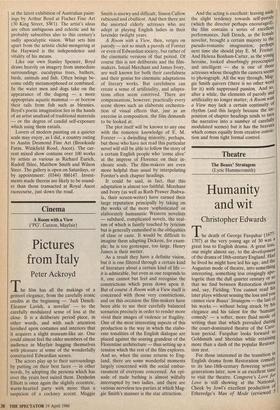Cinema
A Room with a View (PG'. Curzon, Mayfair)
Pictures from Italy
Peter Ackroyd
The film has all the makings of a genteel elegance, from the carefully ironic credits at the beginning — 'Judi Dench: Eleanor Lavish, a novelist' — to the carefully modulated sense of loss at the close. It is a deliberate period piece, in other words, and with such attention lavished upon costumes and interiors that it acquires a slight museum-like air. One could almost feel the older members of the audience in Mayfair hugging themselves with pleasure at some of the wonderfully constructed Edwardian scenes.
The actors play up to their surroundings by putting on their best faces — in other words, by adopting the persona which has over the years best suited them. Denholm Elliott is once again the slightly eccentric, warm-hearted party with more than a suspicion of a cockney accent. Maggie Smith is sinewy and difficult, Simon Callow rubicund and ebullient. And then there are the assorted elderly actresses who are adept at playing English ladies in their lavender twilight years.
A Room with a View, then, verges on parody — not so much a parody of Forster or even of Edwardian society, but rather of the cinematic versions of that period. Of course this is not deliberate and the film- makers, Ismail Merchant and James Ivory, are well known for both their carefulness and their genius for cinematic adaptations of literary works. But carefulness can create a sense of artificiality, and adapta- tions often seem contrived. There are compensations, however: practically every scene shows such an elaborate orchestra- tion of visual effects that, just as an exercise in composition, the film demands to be looked at.
The plot itself will be known to any one with the remotest knowledge of E. M. Forster — a dwindling minority, perhaps, but those who have not read this particular novel will still be able to follow the story of a certain English people who 'come alive' at the impress of Florence on their in- choate souls. The film-makers are even more helpful than usual by interpolating Forster's arch chapter headings.
It could be said, in fact, that this adaptation is almost too faithful. Merchant and Ivory (as well as Ruth Prawer Jhabva- la, their screen-writer) have earned their large reputation principally by taking on the works of the more 'sophisticated' or elaborately humanistic Western novelists — subdued, complicated novels, the real- ism of which is faintly touched by lyricism but is generally enmeshed in the obliquities of class or caste. It would be difficult to imagine them adapting Dickens, for exam- ple; he is too grotesque, too large. Henry James is their metier.
As a result they have a definite vision, but it is one filtered through a certain kind of literature about a certain kind of life it is admirable, but even as one responds to it, one cannot but feel and recognise the constrictions which press down upon it. But of course A Room with a View itself is concerned with those very constrictions, and on this occasion the film-makers have been able to use their carefully balanced scenarios precisely in order to render more vivid their images of violence or fragility. One of the most interesting aspects of this production is the way in which the elabo- rate tonalities of the English dialogue are placed against the soaring grandeur of the Florentine architecture — thus setting up a tension which the rest of the film explores. And so, when the scene returns to Eng- land, there are some wonderful moments largely concerned with the social embar- rassment of everyone concerned. An epi- sode of nude bathing is almost wilfully interrupted by two ladies, and there are various nerveless tea-parties at which Mag- gie Smith's manner is the star attraction. And the acting is excellent: leaving aside the slight tendency towards self-parody (which the director perhaps encouraged), the film contains a series of excellent performances. Judi Dench, as the female novelist, brought a certain majesty to the pseudo-romantic imagination; perhaps next time she should play E. M. Forster. And Helena Bonham-Carter, as the young heroine, looked absorbingly preoccupied and intelligent — she is one of those actresses whose thoughts the camera seems to photograph. All the way through, Mag. gie Smith quivers (there is no other word for it) with suppressed passion. And so, after a while, the elements of parody and artificiality no longer matter; A Room With, a View may lack a certain continuity of rhythm (and this largely because the im- position of chapter headings tends to turn the narrative into a number of carefully modulated scenes) but it has the bravura which comes equally from creative convic- tion and from tight formal control.


















































 Previous page
Previous page